11 Hard-Boiled Egg Myths That Fooled Us All
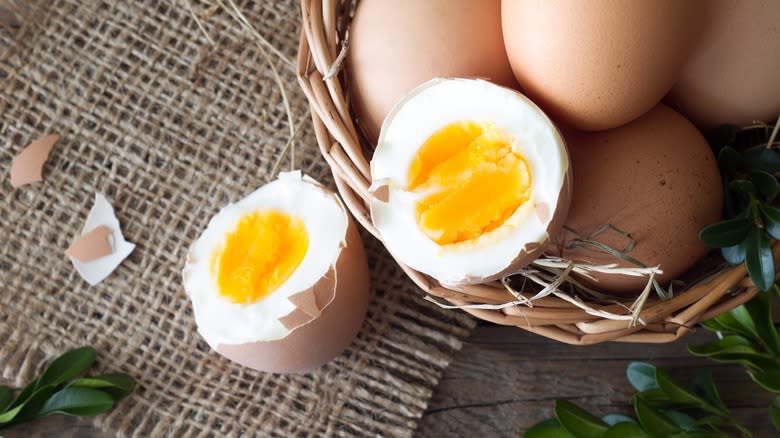
Requiring little more of the chef than placing an egg in a pan of water, heating it, and waiting, hard-boiled eggs are one of the simplest foods to make. This is a wonderful thing, especially since hard-boiled eggs are part of an astonishing amount of recipes; they're both an unexpected ingredient in the best lasagna and the key to Cobb salad. But these eggs are also subject to a number of myths, ranging from claims about the best ways to peel them to rumors about how best to cook them to more concerning notions of food safety.
This is a little surprising, given that hard-boiled eggs are so common -- you'd think we'd have learned everything there is to know about them. But it might just be this simplicity that creates so many myths: When something is so easy to make, a lot of room is left for false notions to sprout. It falls on us to put these myths right. We're taking a look at 11 hard-boiled egg myths that have fooled us all at one point or another.
Read more: The 20 Best Egg Brands, Ranked
Myth: You Should Pierce Your Egg Before Hard-Boiling It
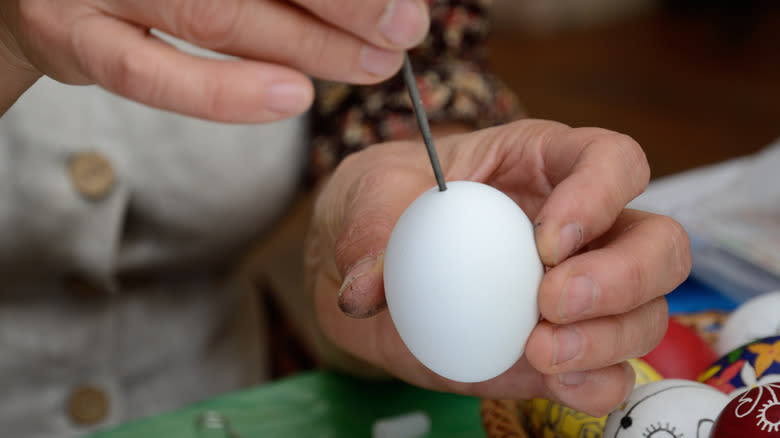
The myth that you should pierce eggs before hard-boiling them is one of the most persistent. Essentially, the idea is that piercing the shell before you cook the egg gives you a better entry point when the time comes to peel, thus making a notoriously annoying process easier. But doing so is unnecessary, and could introduce some real problems. When you pierce an egg, you introduce a foreign body into your food which may not be sterilized. If you're not careful, you can end up adding bacteria to your egg.
Piercing the eggshell also creates an entry point for other bacteria, not just through the needle hole itself, but through any cracks the piercing process creates. Plus, it can weaken the shell and lead to your egg cracking in the pot and leaking everywhere. Aside from all this, there's simply no reason to pierce them in the first place. If you nail a proper peeling technique, like placing your eggs in ice-cold water and peeling them from the bottom, you won't need any extra help from nasty needles.
Myth: Adding Extra Ingredients To The Water Makes Eggs Easier To Peel
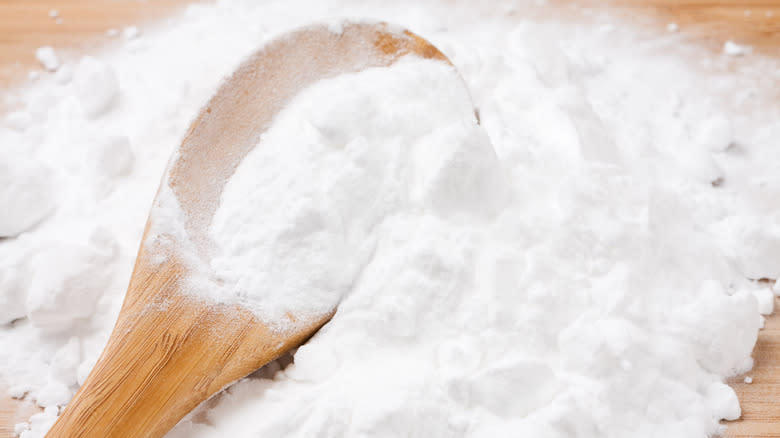
It seems like people will do whatever's in their power to make their hard-boiled eggs easier to peel. One frequently discussed method is to throw whatever's to hand into the water. Baking soda and salt are the most common culprits, with folks assuming that this will somehow make the shell more pliable or looser. Both of these additions, however, have pretty much no effect. Adding salt to your pot may make your water boil faster, but it doesn't have any impact on how well your eggs peel. It also doesn't give them any additional flavor (which may be a good or a bad thing, depending on how you like your eggs).
Baking soda, on the other hand, does affect your egg's flavor -- in the wrong way. Adding baking soda to your water can amp up the sulfuric notes in your egg, making it taste eggier and quite unpleasant. Additionally, it has no impact on how well your eggs peel. Skip both additions, save your money, and focus on using the tried-and-tested technique of submerging them in an ice bath.
Myth: You Can Hard-Boil Eggs Straight From The Fridge
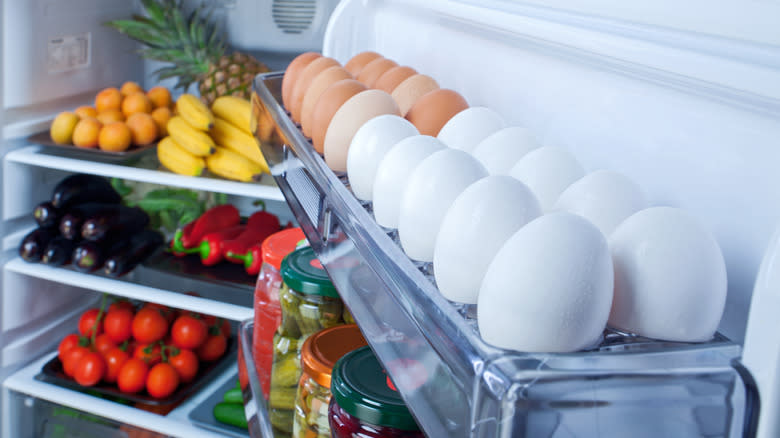
Hard-boiled eggs are pretty low-maintenance, but one pervasive myth about how to cook them can ruin them quickly: Cooking them straight from the fridge. When you do this, you create the ideal circumstances for a temperature shock. When cold eggs hit hot water, the gases inside the eggs heat up rapidly and create additional pressure. These gases then seek to escape via any exit point and usually rupture weak spots in the shell, which causes your eggs to leak into your pan and coagulate.
This reaction is especially pronounced if you place your cold eggs into boiling or near-boiling water, but it can happen with warm water too. You should always keep your eggs in the fridge to maintain food safety, but if you're making hard-boiled eggs, think ahead. Make sure you pull them out of the fridge about half an hour before you plan to boil them. Always start them in a pan of room-temperature water, bringing both eggs and water up to temperature slowly, to minimize the odds of them cracking.
Myth: You Should Only Hard-Boil Old Eggs Because They're Easier To Peel
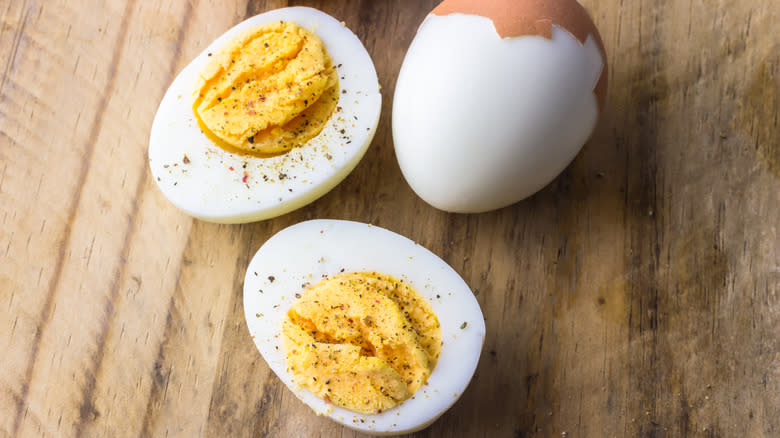
It's fairly common knowledge that the older an egg gets (within reason -- you don't want to use an egg that's gone bad), the easier it is to peel after it's been hard-boiled. As an egg ages, its inner membrane pulls away from the egg white. As a result, when it's cooked, there's more distance between the two elements. It's thus easier to pull the shell (and membrane) away from the smooth, hard-boiled egg.
Somewhere down the line, though, this led to folks believing that you should only hard-boil eggs if they're old. That's just not the case. Fresh eggs are totally peelable, and while they may take slightly more work, it's a matter of a few extra minutes and steps to get the same result. Using an ice bath once your fresh eggs are cooked is the easiest way to peel them. When eggs are submerged in super-cold water, their egg whites contract and pull away from the membrane, creating the same effect that older eggs experience naturally. Once you know this trick, leaving your eggs to age before you cook them becomes a waste of time. Leaving your eggs to get older also puts you at greater risk of inadvertently using a rotten one and ruining both your meal and your day.
Myth: Hard-Boiled Eggs Can Only Be Boiled In Water
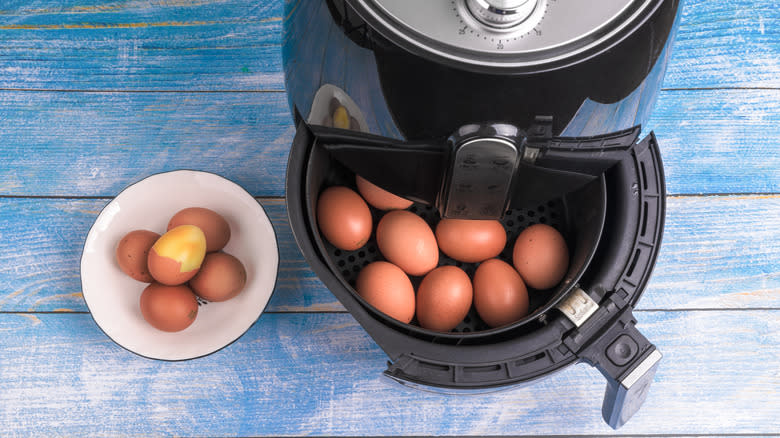
Saying that something is boiled generally means that it needs hot water to be cooked. While this logic seems pretty watertight, it's untrue. There are a number of ways to cook a hard-boiled egg that don't involve submerging them in a rolling boil, yet give you the same result.
If you want to avoid the stove entirely, air fryer hard-boiled eggs save you the hassle of heating water. You just have to place your eggs in your air fryer at a low temperature and allow them to cook for around 15 minutes. Pop them in some cold water for a few minutes to stop them from cooking in their residual heat, then peel and serve as normal. You can also steam your eggs to hard-boiled perfection. A rice cooker is ideal for steaming eggs -- they'll be hard-cooked in approximately 20 minutes.
Myth: Hard-Boiling Eggs Makes Them Safe To Eat
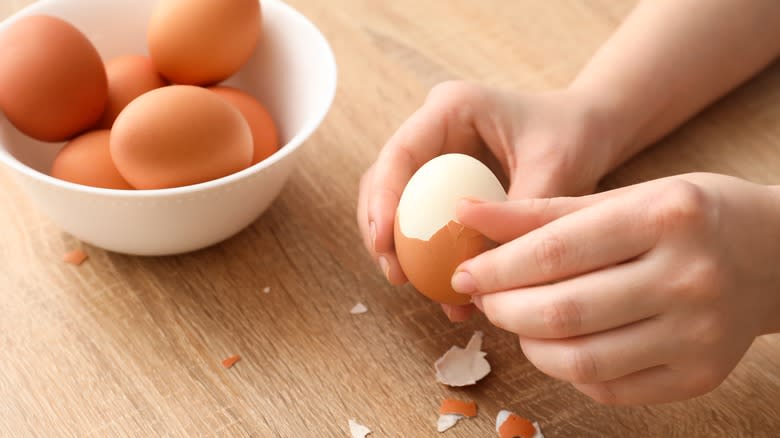
Cooking food to an adequate temperature generally makes it safe to eat, and eggs are no exception. Eggs are especially prone to carrying salmonella -- even fresh eggs can be affected. Hard-boiling eggs can kill this salmonella, making your eggs harmless. Right?
Well, this may not last forever. Hard-boiled eggs may be safe if properly cooked enough to destroy any foodborne bacteria, but they're still more than capable of becoming unsafe after that. Leaving hard-boiled eggs at room temperature for as little as two hours can increase their chance of harboring bacteria, and at warmer temperatures, they can go bad even faster. It's also important to remember that if you don't boil your eggs for long enough, they may retain salmonella bacteria and still be harmful. Eggs have to be cooked to 165.2 degrees Fahrenheit to be safe to eat, and if that temperature isn't reached internally, you may still be at risk of food poisoning. You may also transfer salmonella bacteria from the outside of your uncooked egg to another surface in your kitchen, then back to the egg once cooked. Always practice proper hygiene during cooking.
Myth: You Can Freeze Whole Hard-Boiled Eggs
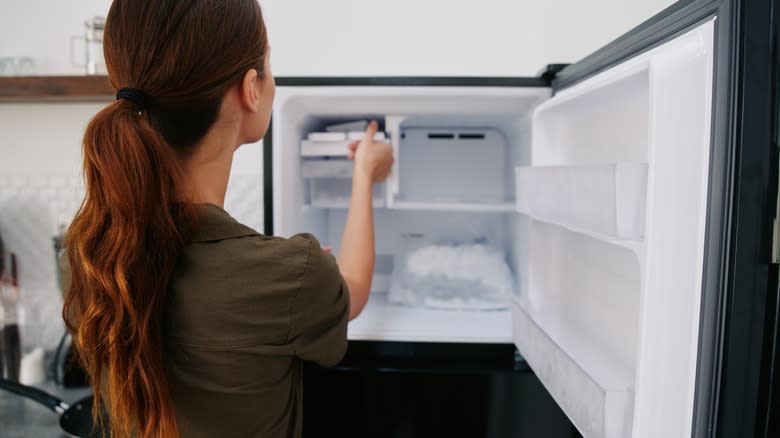
Hard-boiled eggs are hardy pieces of food that are both very transportable and can last for a while once cooked. Specifically, they can last for up to seven days in the fridge, making them the perfect snack to make in a big batch at the start of the week. If you want to extend their shelf life for longer, however, you may be a little disappointed to hear that contrary to popular belief, you can't freeze them whole.
The problem with freezing hard-boiled eggs is their texture. When you freeze them whole, the whites tend to toughen up and become rubbery, and the whole egg gets a little watery and unappetizing. If you still want to freeze your eggs, you'll have to resort to some different strategies. Hard-boiled egg yolks are usually fine once thawed, providing you've separated them from the yolks. You can still use the whites -- just pour them into a different container and freeze them raw. This means that you'll have two different parts to your eggs, instead of one whole one. It's a lot of work, frankly, but if you're determined not to waste food then this could be a great way to preserve them.
Myth: A Hard-Boiled Egg With A Green Ring Is Unsafe To Eat
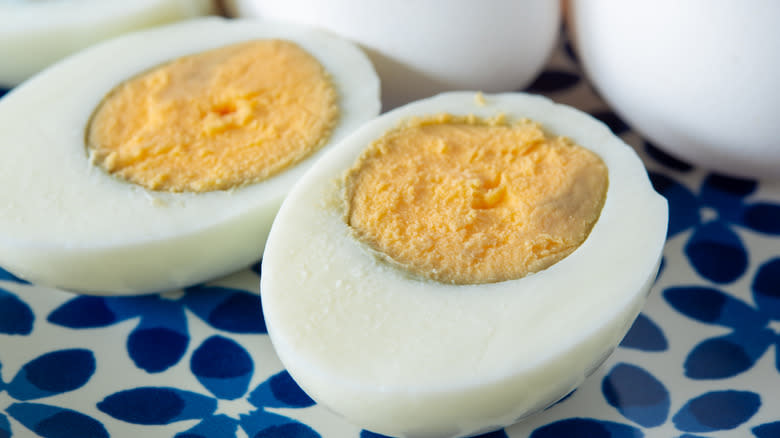
A lot of us have had a moment of shock after cooking our hard-boiled eggs, slicing into them, and finding a dull green ring around the yolk. Many folks throw the eggs out, assuming they've somehow been ruined or are harboring some unknown bacteria.
In fact, a green ring in a hard-boiled egg is completely safe, and results from a natural chemical reaction. Eggs have hydrogen in their whites and sulfur in their yolks (which gives them that eggy smell). When you hard boil an egg, these two elements react with one another on the yolk's surface, with iron also coming into the mix. It's the sulfur and iron specifically that cause the greenness around the yolk, which forms when the egg is overcooked. While your overcooked hard-boiled egg may not have the best texture, you can be confident that it won't harm you. If you find a green ring in your eggs fairly frequently, though, it might be worth adjusting your cooking times.
Myth: When Your Hard-Boiled Egg Is Cooked, It Will Float
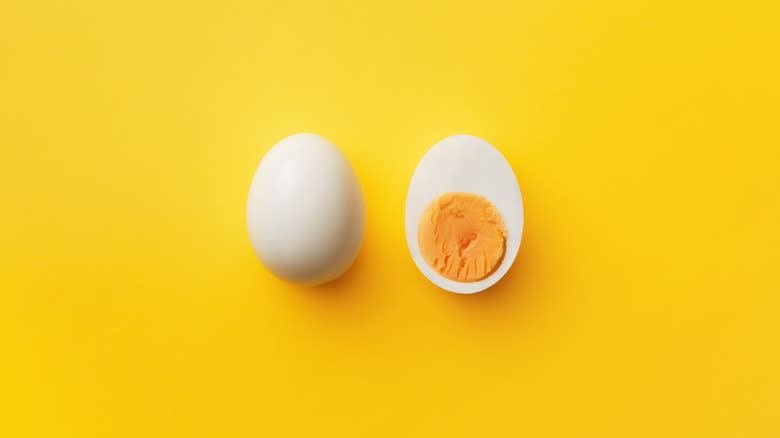
We can sort of understand how this myth formed: After all, your gnocchi floats when it's fully cooked, and there are a host of other foods that do so too -- why not eggs? But in fact, you shouldn't rely on this as a way to tell that they're done. Hard-boiled eggs don't float when they're cooked; they usually sit on the bottom of the pan, whether they're soft-boiled or fully cooked through.
In fact, if your eggs are floating, this could be a serious issue. A floating egg indicates that it's older, due to having a larger air cell, which expands as the egg ages. It can be difficult to tell, without cracking your egg and smelling it, whether an old egg is safe to eat or not -- you may inadvertently be boiling a gone-bad egg. Instead, look for eggs that sink to the bottom of the pan, and focus on timing your eggs to make sure that they're fully hard-boiled. A perfect hard-boiled egg will take 15 minutes to cook in just-boiled water that's been removed from heat.
Myth: You Can't Reheat Hard-Boiled Eggs
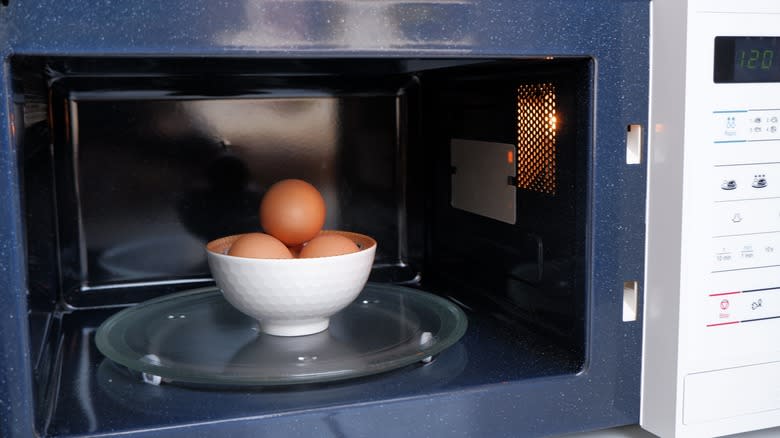
Have you ever tried to reheat a hard-boiled egg? Probably not, and it might be because you've been told that it can't be done. But this is a myth -- one that's likely led to people enduring way more cold hard-boiled eggs than they ever needed to.
We imagine this myth came about because of what happens when you microwave a hard-boiled egg: Simply put, they explode violently. The microwave heats the moisture left inside the boiled egg, and it bursts. The key is to reheat them slowly, using the method you originally employed to cook them. All you need to do is cover your hard-boiled eggs with boiling water and leave them to stand for around 10 minutes. The water's heat works to gently reheat the eggs, without causing them to toughen (or to blow up). You can also steam your hard-boiled eggs to reheat them by popping them over some boiling water in a steaming basket for a couple of minutes.
Myth: For Multiple Hard-Boiled Eggs, Just Throw Loads Into The Same Pot
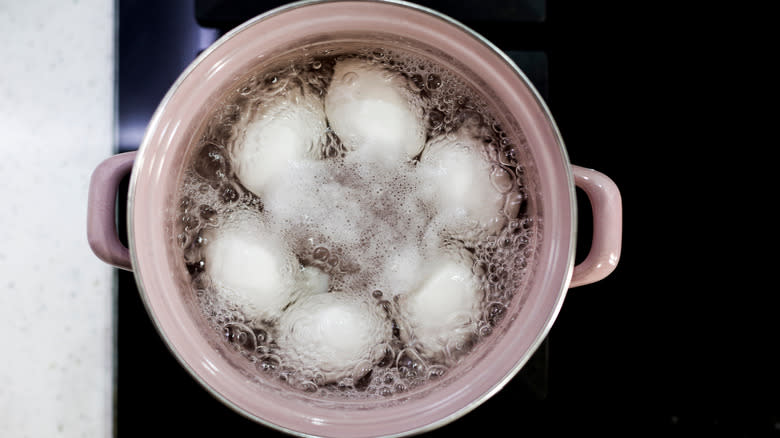
Hard-boiled eggs are one of the best foods to batch cook. The idea that you can carelessly throw them into the same pot and wait for them to boil, however, is misguided and can lead to a lot of broken eggs. Layering eggs on top of each other in a pan is fairly precarious, and when the boiling water starts to move them about, they can clatter into one another. If you have a lot of eggs knocking around, it can lead to some of them cracking.
Placing a load of eggs on top of each other can also keep the water from circulating properly. This leads to eggs cooking at different rates -- you may end up overcooking some while waiting for others to firm up. Rather than ruin your eggs, it's best to place them in a single layer, using a wide pot. Ensure that they're not crammed in together. If you have to, it's always a better move to cook them in a few different batches, rather than risk breaking some.
Read the original article on Daily Meal


